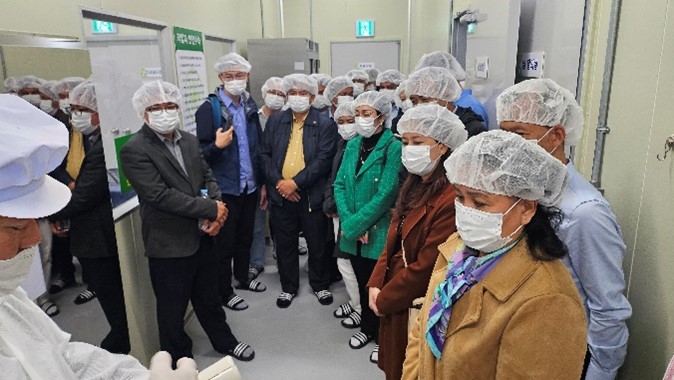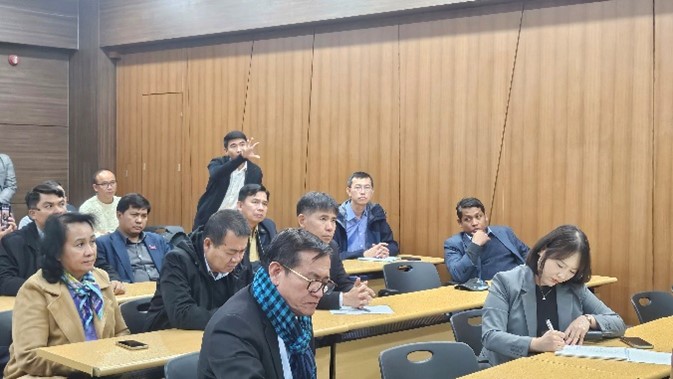
Cambodia focuses on implementing comprehensive rural development and shifting toward higher-value-added activities in agriculture since around 12.6 million people live in rural areas. In 2023, agriculture contributed approximately 21.5% to the nation's GDP.
The Korea Green Growth Trust Fund of the World Bank has supported a grant project, ‘Harnessing digital agriculture technologies for smallholder farmers in Cambodia,’ to enhance smallholder farmers' access to high-quality inputs and extension services by leveraging digital technologies in Cambodia. It is connected to three projects funded by the World Bank; Land Allocation for Social and Economic Development Project III (LASED III), Cambodia Agricultural Sector Diversification Project (CASDP), and Cambodia Sustainable Livelihood for Indigenous Communities Project (CSLICP).
From November 7 to 9, 2024, with funding from the KGGTF of the World Bank, 33 stakeholders of the World Bank’s projects had a valuable opportunity to visit South Korea through the "Knowledge Exchange Program." This KGGTF KE program provided a broad perspective, allowing delegates to explore the transition of South Korean rural development and agriculture from the Saemaul Undong of the 1970s to modern agricultural innovation.
Yeungnam University
Delegates visited Yeungnam University to start their KE program and gain an understanding of Saemaul Undong. The president of Yeungnam University, Dr. Oe-chool Choi, explained the principles of how Saemaul Undong could achieve great success, highlighting the political philosophy of national leadership, education sessions based on free discussions, and village support through a strategy of selection and concentration. The delegates found that it is important to keep inspiring people to change their mindset for a better life through mainstreaming the spirit of self-reliance (diligence, self-help and cooperation). For Cambodia, these principles align well with local community-based initiatives and the push for self-sufficiency in rural development.

The Memorial Park of Saemaul Undong
The memorial park of Saemaul Undong in Cheongdo offered delegates informative archives on how President Park Chung-hee was inspired by rural residents' voluntary flood recovery efforts to initiate the Saemaul Undong, which later expanded into a national rural development policy. The delegates gained an understanding of how Saemaul Undong expanded nationwide to include urban areas and became a fundamental driver of South Korea's economic development, grounded in a core 'can-do' spirit.
Gyeongsan Agricultural Processing Center
The agricultural processing center is established to promote farmers by providing shared facilities and equipment, thereby reducing the initial investment burden. The delegates enjoyed tasting the samples produced at the center and observed the HACCP-certified processing equipment to produce in juice, powder, and gelato types. Delegates could consider how adding value to the agricultural products of smallholder farmers in Cambodia could maximize off-farm income.

Smart Farm Innovation Valley in Sangju City, Gyeongsangbuk-do
The Smart Farm Innovation Valley in Sangju City, Gyeongsangbuk-do, was established to foster young farmers specializing in precision agriculture, lease facilities for farming start-ups, support smart farm R&D for data farming, and improve corporates with innovative technologies. The delegates recognized the need to adapt the facility to a scale and level suitable for Cambodia's local context, highlighting the importance of modernizing Cambodian agriculture through the advantages of intelligent farming.
Thanks Carbon
Thanks Carbon offers a carbon emission monitoring service called Heimdall. Its deep learning AI model for detecting water levels in rice paddies using satellite images demonstrates 90% accuracy and allows farmers carbon credits. The delegates had an opportunity to gain deeper insights into new climate-smart agriculture technologies and evaluate the applicability of innovative technologies to ongoing projects.


